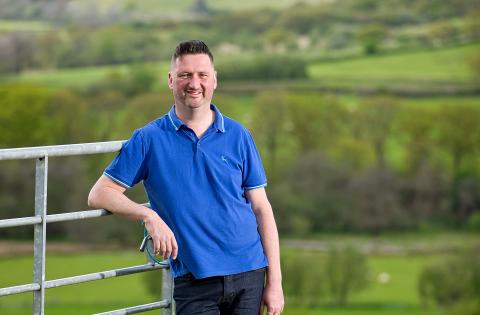A qualified careers adviser with a background in the hospitality industry, Roland combines his part-time role with ‘Big Ideas Wales’ supporting young budding entrepreneurs, with diversifying his traditional eighth-generation hill farm into a sustainable, resilient business he hopes to pass on to the next generation.
Having always been closely involved with the farm, following a family bereavement Roland inherited the flock of traditional breeds that graze on the Epynt Military Range and adjoining common, as well as three lowland closed flocks, all finished on farm and sold as fat lambs.
“My exchange will introduce me to other farmers who have diversified into providing ‘wellbeing’ enterprises, offering alternative accommodation focusing on ‘eco-friendly ‘and holistic therapies connected with a natural lifestyle.”
EXECUTIVE SUMMARY
Collaboration mutually beneficial to farm diversifications, study finds
Farmers are being urged to work collaboratively with other producers and organisations to maximise the effectiveness of their farm diversifications.
Roland Wear, who embarked on a Farming Connect Management Exchange programme study to explore additional income streams for his family’s traditional hill sheep farm, says many diversifications can benefit from collaboration.
He saw this in action on farms he visited in Italy and Scotland during his study.
Roland’s farm has been in his family for at least eight generations and, as he looks towards the future, he is keen to develop a sustainable business for subsequent generations. This has so far included creating a new holiday cottage business venture.
He also hopes to put to use his background in the catering and hospitality industry.
The farms he visited had developed thriving diversifications, from one that produced goat’s cheese and yogurt, olive oil and producing pasta from their own wheat, to another that provided five star accommodation and meat box sales.
“A diversification project can prove to be more profitable that the current farming practices and open other funding streams,’’ he says.
“One successful diversification can take you in other directions.’’
But some can take substantial investment and commitment too, he adds.
Roland says the study had helped develop his understanding that welcoming guests onto a farm can create great interest, enthusiasm and, most importantly, an additional income.
He has a broad skillset from his previous career in hospitality and through his current role, promoting entrepreneurship to young people as a regional executive at Big Ideas Wales.
But the study reinforced his belief that support through training is essential for developing skills.
And the most successful diversifications are those where a farming family focusses on the skills and interests personal to them, he says.
“Having a unique selling point and being different will attract interest from prospective customers.’’
It is also important to consider what the next generation might like to be involved with, he adds.
As a result of his study, Roland now plans to explore whether financial support and advice exists for developing on his own farm some of the projects he saw.
“I am also keen to look at what I could offer on farm as an experience, using my own skill set, identifying any gaps and potential training opportunities and support required,’’ he says.
MANAGEMENT EXCHANGE REPORT


